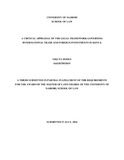| dc.description.abstract | "What would this island (Earth) be without foreign trade, but a place of confinement to the inhabitants, who (without it) could be but a kind of hermites, as being separated from the rest of the world; it is foreign trade that renders us rich, honourable and great, that gives us a name and esteem in the world.”1
Charles Molloy,2
De Jure Maritimo et Navali, 1676
_____________________________________________________________________________
Kenya has since independence been a significant player in international trade and foreign investments. The changes in the inter-state system associated with globalization have led countries to search for new forms of international economic cooperation, in a bit to enhance international trade and investments. Kenya is now part of the globalized world where globalization is seen as an impetus towards interconnectedness of states and no state can survive in isolation. Kenya therefore cannot achieve viable economic goals without international trade and investment and indeed no country can succeed without international trade. This study evaluated the legislative framework governing international trade and foreign investment in Kenya. The study also appraised: the principles of National Treatment and Most-Favoured Nation in international investments treaties more particularly those ratified by Kenya; the effect of fidelity clauses in International Investment Agreements; and the role played by capital structure of foreign firms in domestic market and the essence of arbitration in international commerce and how they affect foreign investments in Kenya. These, are discussed under different thematic areas in this study. The study established that there are sufficient laws but inefficient and ineffective in governing international trade and foreign investments in Kenya. The study recommended for: Enhanced comprehensive policy, legislative and regulatory framework; strengthening institutional and enforcement mechanisms; creation of a robust intellectual property rights regime; harness and formulate a vibrant international commercial arbitration system and meaningful anticorruption administration in governance of international trade and foreign investments in Kenya. | en_US |



